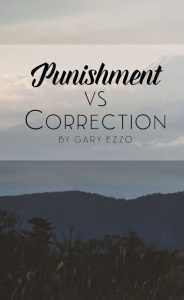Are punishment and correction the same thing? If not, what’s the difference? Let’s start by defining the terms: Punishment is the fitting retribution of an offense. In child training, it serves a moral purpose; it communicates to children a value of good and evil by the weight of punishment ascribed to each wrongful act. The administration of punishment is dependent upon and inseparably linked to the proper administration of authority. That means the right of punishment belongs only to those clothed with authority and who exercise such in submission to the wisdom of Scripture. Pain, loss, or restraint willfully inflicted on another person outside of the rightful administration of authority is aggression or revenge, but it is not punishment.
Punishment is one element of correction, but not all correction is tied to punishment. Correction is the act of bringing back from error or unacceptable deviation from the standard. The reason we correct our children is basic–it helps them learn. But in order to maximize the learning side of correction, we need to understand two governing principles.
The first one is this: The type of correction depends on the presence or absence of malicious intent. Parents should ask, “Was my child’s wrong action accidental or intentional? Did he know what he was doing was wrong?” The answers to those questions will help determine which type of correction will best serve the offense. This is the dividing line: separating the unintentional from the intentional.
The second rule of correction is this: The punishment/consequences must fit the crime. Punishment sets a value on behavior. That is why over-punishing or under-punishing is dangerous; both send the wrong message. When any society establishes a baseline for punishment, it is placing a value on the seriousness of a wrongful act. Punishment places a value on the action.
In parenting, a child’s sense of justice is established through punishment, not rewards. For example, if a child hits and bruises his sister with a plastic bat, and then is punished by receiving five minutes in the timeout chair, the parent established in the mind of the child that hurting other people is not a serious infraction. Over-punishments goes to the other extreme. When a parent says, “You left your light on after leaving your room and for that, you can’t have any friends over for a month,” that can easily be considered over-punishing. This fosters exasperation and more conflict.
Stay mindful of these two principles. Before an offense can be dealt with most effectively, the parent needs to ask two questions: “Was what my child did the result of an accident or was it malicious?” “Was it childishness or foolishness?” Second, “What punishment would fit the wrong and convey the right value message?
Excerpt taken from Growing Kids God’s Way by Gary and Anne Marie Ezzo.





Leave a Reply